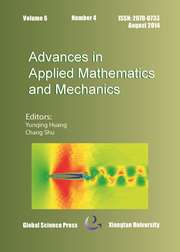Article contents
Thermoelectric Viscoelastic Fluid with Fractional Integral and Derivative Heat Transfer
Published online by Cambridge University Press: 29 May 2015
Abstract
A new mathematical model of magnetohydrodynamic (MHD) theory has been constructed in the context of a new consideration of heat conduction with a time-fractional derivative of order 0 < α ≤ 1 and a time-fractional integral of order 0 < γ ≤ 2. This model is applied to one-dimensional problems for a thermoelectric viscoelastic fluid flow in the absence or presence of heat sources. Laplace transforms and state-space techniques will be used to obtain the general solution for any set of boundary conditions. According to the numerical results and its graphs, conclusion about the new theory has been constructed. Some comparisons have been shown in figures to estimate the effects of the fractional order parameters on all the studied fields.
Keywords
Information
- Type
- Research Article
- Information
- Copyright
- Copyright © Global-Science Press 2015
References
- 5
- Cited by

